
Rice, DOE labs tackle knowledge gap in materials science research
Rice materials scientist Lane Martin and collaborators shed light on mesoscale structures in high-tech material with potential use in next-generation electronics, lasers and sensors.

Rice, DOE labs tackle knowledge gap in materials science research
Rice materials scientist Lane Martin and collaborators shed light on mesoscale structures in high-tech material with potential use in next-generation electronics, lasers and sensors.
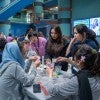
Students find inspiration at Tapia STEM Camps
The Tapia STEM Camps, founded by and named after Richard Tapia, aims to encourage students from underrepresented communities to pursue STEM careers.

Breaking MAD: Generative AI could break the internet
Rice researchers have found that training successive generations of generative artificial intelligence models on synthetic data gives rise to self-consuming feedback loops.
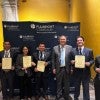
Rice is top destination for Mexican students who receive Fulbright awards
Seven master’s and Ph.D. Fulbright recipients from Mexico will study at Rice this fall, the most of any university and nearly double the number of any other university, including Rice’s Association of American Universities peers.

Rice lab finds faster, cleaner way to extract lithium from battery waste
Rice researchers uncover a rapid, efficient and environmentally friendly method for selective lithium recovery using microwave radiation and a readily biodegradable solvent.

Brazilian students explore AI and infrastructure resiliency at Rice amid Hurricane Beryl
A group of undergraduate students and faculty from Brazil spent a week at Rice exploring the role of artificial intelligence (AI) in sustainability and natural disaster resiliency practices as part of a knowledge and cultural exchange program funded through the 100,000 Strong in the Americas initiative.

Tanzanian officials praise NEST360 contribution to newborn care
Rice President Reginald DesRoches joined Rice360 Institute for Global Health Technologies Co-Director Maria Oden and Rice360 supporters on a trip to Africa marking significant milestones on the road to ending preventable newborn deaths in the sub-Saharan region.
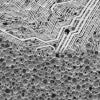
Foam fluidics showcase Rice lab’s creative approach to circuit design
Rice engineers have shown that something as simple as the flow of air through open-cell foam can be used to perform digital computation, analog sensing and combined digital-analog control in soft textile-based wearable systems.

A group of students from Rice’s School of Architecture and George R. Brown School of Engineering visited Barcelona, Spain, in June as part of a global “Building Ecologies” workshop.

Rice students explore ‘new perspective on problem-solving’ in Paris summer program
A group of Rice students experienced firsthand how travel can enhance education during a two-week trip to Paris as part of the international Summer Experience in Engineering Design program, or iSEED.
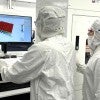
Rice researchers advancing microelectronics manufacturing on DARPA-funded team
Rice is a key partner on an $840 million project to develop the next generation of high-performing semiconductor microsystems for the U.S. Department of Defense.
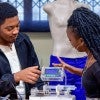
Rice researchers and partners in Kenya win $2.5M for innovation-focused master’s program
Rice360 and Kenya partners are establishing a first-of-its-kind graduate education program with a $2.5 million grant from the Lemelson Foundation.

Rice neuroscientists to build state-of-the-art neural recording system
Rice neural engineer Chong Xie and his team have won a $2.9 million R01 grant from the NIH to develop a state-of-the-art implantable neural electrode system that is highly biocompatible, untethered and capable of stable, long-term and large-scale neural recording and stimulation.

Rice experts available to discuss variety of Olympic-related topics on 2024 Paris Games
Experts from are available to discuss Olympic-related topics with the media.

Future of bioelectronics takes center stage at Rice Global Paris event
The Rice Global Paris Center hosted the BioElectronic Therapeutics (BETx) conference and workshop June 27-28, the first formal event dedicated to the field of bioelectronics to be held at Rice’s Paris campus.